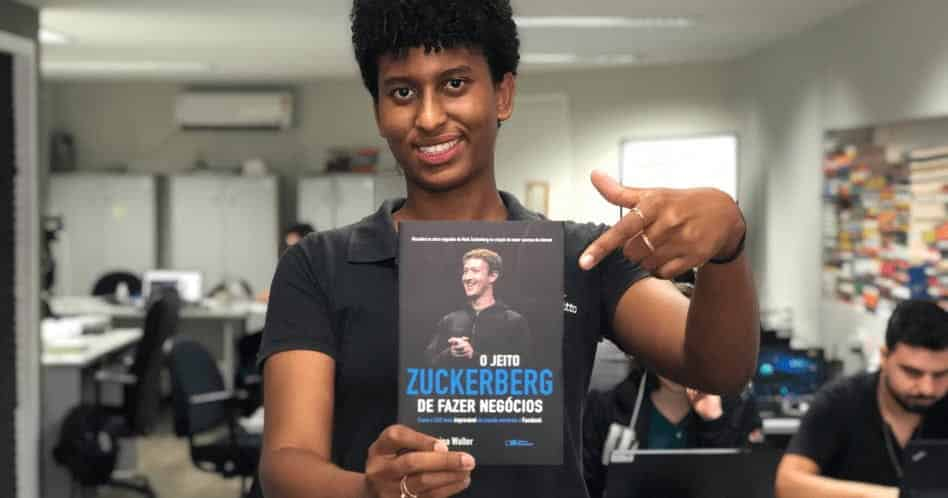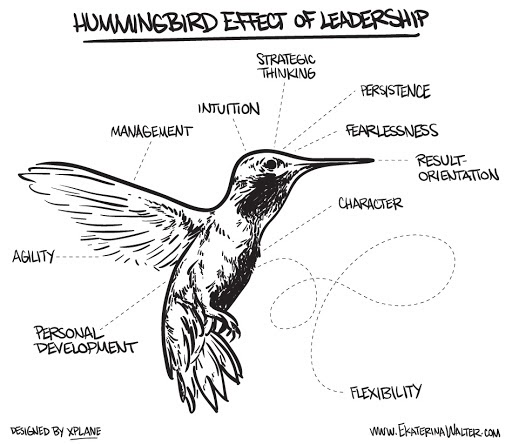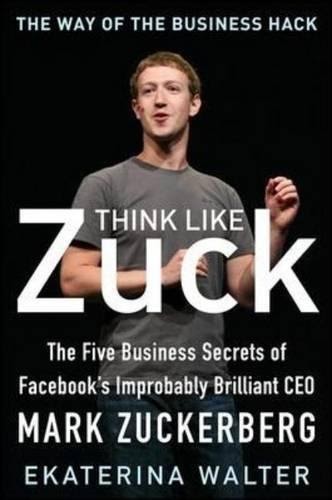
Think Like Zuck - Ekaterina Walter
Mark Zuckerberg's success has been summed up in "5 P's" which, if applied in your personal and professional life, will make you an exceptional leader and manager.
Add to Favorites
Add to read
Mark as read
Ekaterina Walter, business and marketing innovator, brings in her book, "Think Like Zuck", the main teachings of the creator of the most accessed social network in the world.
How many photos have you liked on your Facebook? And how many comments did you leave to your friends? How many times have you checked in or said on your timeline how you were feeling?
All of this is only possible thanks to Mark Zuckerberg, who made his passion for connecting people over the internet a reality with his totally unlikely vision.
But relax, it can all be learned from the 5 P's of success that, if applied to your work and personal life, can make you an exceptional leader and manager.
Want to know how to absorb all the teachings of the most successful creator of the internet?
So come with me!
About the book "Think Like Zuck"
"Think Like Zuck" (2013), written by author Ekaterine Walter, brings examples from successful companies such as Zappos, Threadless, CollegeHumor, TOMS, Dyson and shows, in particular, how the emergence of Facebook has changed the way people communicate and engage.
The Wall Street Journal bestseller has 216 pages with the five secrets of Mark Zuckerberg's company success: passion, purpose, people, product and partnerships.
About the author Ekaterine Walter
Ekaterine Walter is a writer, speaker, and social innovator who has provided marketing and business initiatives for an extensive list of brands, including Intel.
She is one of the directors of the International Mouth-to-Mouth Marketing Association (WOMMA) and is on Fortune magazine's list of most influential business people in social media.
She is also the co-author of the books "The Power of Visual Storytelling" and "The Laws of Brand Storytelling".
According to your profile in Forbes magazine, your favorite questions are "Why?", "What if?" and "How can I help you?".
To whom is this book indicated?
The book "Think Like Zuck" is recommended for all those who need inspiration, knowledge and understanding to leave a mark on the world that is not so simple to change.
It is also suitable for those who want to make a difference in the area of entrepreneurship and leadership.
Finally, the work is ideal for you who want to know all the lessons that the creation of "Zuck" has to offer us!
Main ideas of the book "Think Like Zuck"
- "Keep your energy and dedication to the maximum by pursuing something you believe in";
- "Don't just make a great product, lead a significant move";
- "Strengthen powerful teams that can execute your vision";
- "Break all the rules by creating an innovative product that changes everything";
- "Develop great partnerships that nurture creativity and energize execution".
Download the "Think Like Zuck" Book Summary in PDF for free
Do you have no time to read now? Then download the free PDF and read wherever and whenever you want:
Overview: Passion
On September 20, 2005, the "new internet prince" company consolidated itself as Facebook. But even before that, in the 1990s, Mark Zuckerberg created "Zucknet" to connect his family's computers.
All this for the passion of connecting people through the internet.
"Because they are more connected, the world will be a better place, people will be more understanding and more empathetic", Zuckerberg said in one of his talks.
According to the author Ekaterine Walter in her book "Think Like Zuck", one of the things that set Facebook's founder apart from so many frustrated entrepreneurs is passion. This feeling leads us to believe in our dreams, turning them into reality.
Therefore, there is no failure for those who have a passion for what they do. That is why Mark does not consider his unsuccessful attempts to fail.
In the words of Pedram Keyani of the Facebook integrity team:
"Hacking is working passionately for a goal and not being afraid of failure."
Given this fact, Zuck never relinquishes control of the social network.
For Zuckerberg, there are no original ideas. The ideas are ready and enough information is needed to make exclusive communications that meet our passion.
For this reason, the social network created was very similar to MySpace and Friendster, but Mark's passion made him see and develop differences that made him create the empire he owns today.
To prove her case, Ekaterine Walter cites Srully Blotnick's book "Getting Rich Your Own Way", which features a study of 1, 500 business school graduates to track their success based on their choices after graduation.
The survey showed that 83% of people would leave their dreams in the background awaiting financial improvement, while the rest said they preferred not to care about monetary returns, and followed their dreams first.
The survey, after 20 years, analyzed that 100 of the graduates of the second category mentioned were millionaires. Of the other 1245 who thought of money first, only ONE - that's right, one - became a millionaire.
This makes us think that having a desire is not enough, it is necessary to act. According to the author's words:
"Without action, your wish is just that: a wish."
And that's exactly what separated Mark from the rest, he didn't just stand still, he acted.
Facebook headquarters is in Palo Alto, USA, and there is a hanging poster that says: "Done is better than perfect".
Not only does Mark Zuckerberg preach passion as a prerequisite for success:
- Blake Mycoskie is a founder of TOMS, and had a passion for distributing shoes to children living in poverty;
- Chris Gardner was from a homeless young man with his young son to be a multimillionaire broker, investor, and philanthropist. You must know his story through the movie, or book, "Looking for Happiness". He says that you must "find something you love so much that you can't wait for the sun to rise again";
- Steve Jobs believed that "people in love can change the world for the better". And he advised in a 2006 speech at his graduation: "If you haven't found what you want to do, keep looking, you'll know when you find it".
Finding your passion and taking action to reach the result is a part of the journey. Now is the time to find your heart and your business: the purpose!
Overview: Purpose
"Big companies don't just create great products, they create movements."
In this part of the book "Think Like Zuck", author Ekaterina Walter tells the story of four Soviet soldiers who were caught in ocean storms without communication with the base.
With the military principle of "leaving no man behind", they rationed food and water, which only served for two days. Maintaining this behavior, they survived for 49 days until found by the US Navy.
But why did they survive in the midst of these adversities? Simple, they had, in addition to their passion for life, a common purpose: to be found or to find someone who could help.
In the business environment it is no different. The purpose is the "why" of the organization to exist. What is the difference that the organization makes in the world?
For Mark Zuckerberg and his fellow Facebook creators, the reason for the network was simple: "make the world more open and connected".
It is important to realize that a company's mission can change, as it is the speech made for the outside and inside of the business. But the purpose remains the same.
Here's how Facebook's speech has changed, but they say roughly the same thing:
- 2004: "Facebook is an online directory that connects people through college social networks";
- 2012: "Founded in 2004, Facebook has a mission to make the world more open and connected. People use Facebook to connect with friends and family and express things that are important to them".
The author Ekaterina Walter also says that in order to keep the company following its founder's purpose, we need values and leaders who can reinforce and show them in practice.
After all, successful leaders don't care about outside pressures when they only need to focus on their vision and values.
Mark Zuckerberg has changed the way we connect, and the interesting thing is that it was exactly what he wanted!
Overview: People
"There is no more vital factor to a company's long-term success than the quality of its human capital."
A good team is always the subject of books on leadership and business. This is no different. So much so that the author Ekaterina Walter dedicated an entire chapter of the book "Think Like Zuck" to talk about it.
Ekaterina emphasizes that a great team is critical to the success of an idea.
In this part, the strong relationship between employee engagement and business success is presented. Employee happiness is always related to greater productivity, safety and, consequently, greater profit.
But, as stated in the previous overview, the leader needs to share vision and values with the team, making them all follow the same path behind the same dream. And that is what defines the corporate culture.
The company XPLANE has taken the culture map to another level. The future vision of this business design and consulting firm was stuck in a culture that did not favor growth.
To solve this problem, a culture map has emerged that has key characteristics that determine the expected behaviors of employees:
- Transparency in leadership and led;
- Insatiable curiosity;
- Internal knowledge sharing;
- Help among team members;
- Decision making at all levels;
- Visual management.
Facebook doesn't have a culture map as visual as XPLANE, but the company has a hacker culture.
The hacker path involves progress and repetition. With it, employees are encouraged to focus on impacting, being quick, bold, open and creating social value.
According to Mark Zuckerberg, finding competent people is a difficult process. However, finding competent people who also agree with the company's purpose may seem like an almost impossible task.
The author Ekaterina Walter says that:
"The right people are those who share their beliefs, live their values and fight for their purpose."
In addition, they are the ones who will see the changes coming and will alert you and guide you on the right path.
But if you want to be part of the Facebook team, the process is complicated too. There are two programming puzzles, plus four interviews that analyze the candidate's ability to solve problems technically.
Hiring the right person is the last problem since once that perfect programmer joins the team, you need to keep him there.
The company has several forms of people's motivation. One is Hackatona, which consists of overtime of the month for employees to submit their improvement proposals.
The most interesting thing about this Hackatona is that they are not planned in advance. A question arises, "Hey guys, are you going to make a hack?", and it spreads like bad news.
"If you want an extraordinary company, you need to fill it with extraordinary people."
The tip for leaders is the hummingbird effect.
Hummingbirds are animals with several positive characteristics that can be expressed in a leader:
Image taken from the book "Think Like Zuck".
According to Ekaterina Walter, Mark Zuckerberg is a perfect example of a hummingbird leader. And what about you?
Overview: Product
This part of the book "Think Like Zuck" starts in a way that can be frightening: "Facebook is changing". How is the social network that has consolidated in the market and still holds the largest number of users in the world-changing?
At the time of its launch, Facebook was an ideal product for its market. But if Mark Zuckerberg had been satisfied, the changes in society and other companies would have hit him.
Once widely criticized, but used by Harvard University, Facebook has revealed the need for social networking.
As a good strategist, Mark Zuckerberg installed his creation in Stanford and Yale, where they already used internal social networks.
Once it began its growth, it never stopped. In addition, several investments have been made, which allowed for further expansion.
According to the author Ekaterina Walter, some features that Facebook received on its journey were:
- Murals and groups: the murals were an instant hit, and allowed users to make posts that automatically appeared to their network;
- Photos with tagging capability;
- News feed;
- Beacon: was a social advertising system and was created in 2007 and discontinued in 2009; and
- Timeline.
With the example of some features above, you can see that the vast majority exist to this day, but Beacon, like many others, has been discontinued.
This is because the leader or manager must "know when to quit or say no", as "it is a crucial strategic quality for any business".
The product is a mixture of passion for what you are creating, purpose to know where you want to go with it, people and partnerships, as we cannot achieve anything alone.
Overview: Partnerships
This overview, as well as chapter 5 of the book "Think Like Zuck", will begin by explaining that partnerships are those that the person who inspires and motivates a team makes with the person who has a strategic and analytical vision.
Also, it is noteworthy that this partnership is internal and must occur within yourself to become a complete leader, just like our friend Zuck.
But interpersonal partnerships are also important. For example, Mark and Sheryl Sandberg, author of the book "Lean In", began with business meetings for personal friends.
The shy, geeky young man from Harvard teamed up with the communication-minded lady and together they managed to complement each other to leverage personal and professional lives.
While Zuckerberg focuses on what he loves: creating new products and features, Sandberg focuses on what she does best: managing business functions.
The author Ekaterina Walter calls this type of partnership "The Visionary and the Builder". The first is the one who dreams and imagines, and the second builds it based on the vision of the first.
It also features other such powerful partnerships, such as Walt Disney (visionary) and his brother Roy Disney (builder).
HP's founding friends, William Hewlett and David Packard, are also a successful duo. The big curiosity is that they threw a coin to decide the company name, and today you can't imagine calling the company PH, right?
It's important to have not only this instant compatibility, but also other features for a successful partnership:
- "Clear Expectations";
- "Shared values and vision";
- "Mutual trust";
- "Fair exchange of values";
- "Complementary forces";
- "Commitment"; and
- "Mutual Respect".
What do other authors say about it?
In the recommended "Everybody Matters", the authors Bob Chapman and Raj Sisodia explore how true leaders must continually study to develop and develop those around them so that they can also become excellent leaders who believe and value people.
In addition, employees should be encouraged to innovate and try new things, even if they fail. This makes them realize that managers have full confidence in their potential and their work. In the book, this practice is called "responsible freedom".
Ed Catmull, the author of the book, "Creativity, Inc.", advises: always give people more preference than ideas, because creative people create good ideas, but good ideas can be destroyed by bad teams. That's why author Ekaterine Walter tells us in this book that we must know how to choose the right people.
Eric Ries, in "The Lean Startup", explains that it is important that the word "innovation" be understood widely. These can be original scientific breakthroughs, a new use for existing technology, creation of a new business model, among others.
Okay, but how can I apply this to my life?
The book "Think Like Zuck" is filled with analysis and stories that motivate and make us believe that if we act, anything is possible.
So let's remember the 5 P's that made Facebook a success:
- Passion: do what you love and run after it. The benefits always come to those who believe in what they are doing. Ask yourself, "What do I love to do?";
- Purpose: know where you want to go and the purpose in relation to your exterior. Ask yourself the question, "If I could change something in the world today, what would it be?";
- People: not only hire the right people but cultivate them so that you can reap these fruits and walk stronger in one direction;
- Product: create the product is the starting point, but improving it and knowing when to take a step back is just as important;
- Partnerships: join people who complement you and who can take you further. Recognize your weaknesses and chase after who can help you with them.
I am sure that with these teachings you are better prepared to pursue your dreams. And maybe I see your name as the next most unlikely CEO in the world?
Did you like this summary of the book "Think Like Zuck"?
We hope you enjoyed our summary and are able to apply Mark Zuckerberg's five secrets to your life and your business. Leave your opinion in the comments, your feedback is very important to us!
In addition, to learn more about the content, purchase the book by clicking on the image below:

![Click and download the PDF! [Book Summary] Think Like Zuck - Ekaterina Walter](https://images.prismic.io/pb4y/YzU4NTA0NjgtNWVjMC00ZWVjLThjMTQtZGFkZTY4ZGVhMDVl_0pikt82sloraxnrswcbhkhi95gj2tieaipv1d6krkdy2ftneeslclmud7ssejc6crxngjq3pmpmm4lbm_kjdiljxmpfdrsvfzo5hfjralmfu-edsf_d0qcjpzbqdqnt-4msgqyoo)

